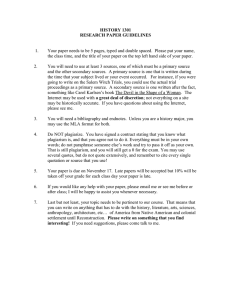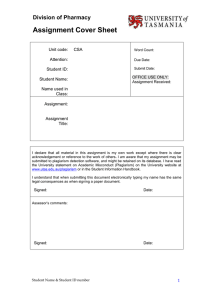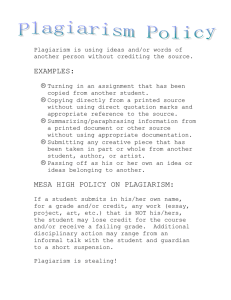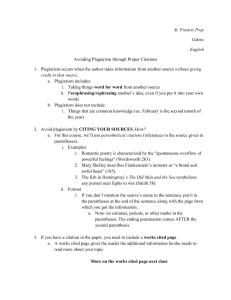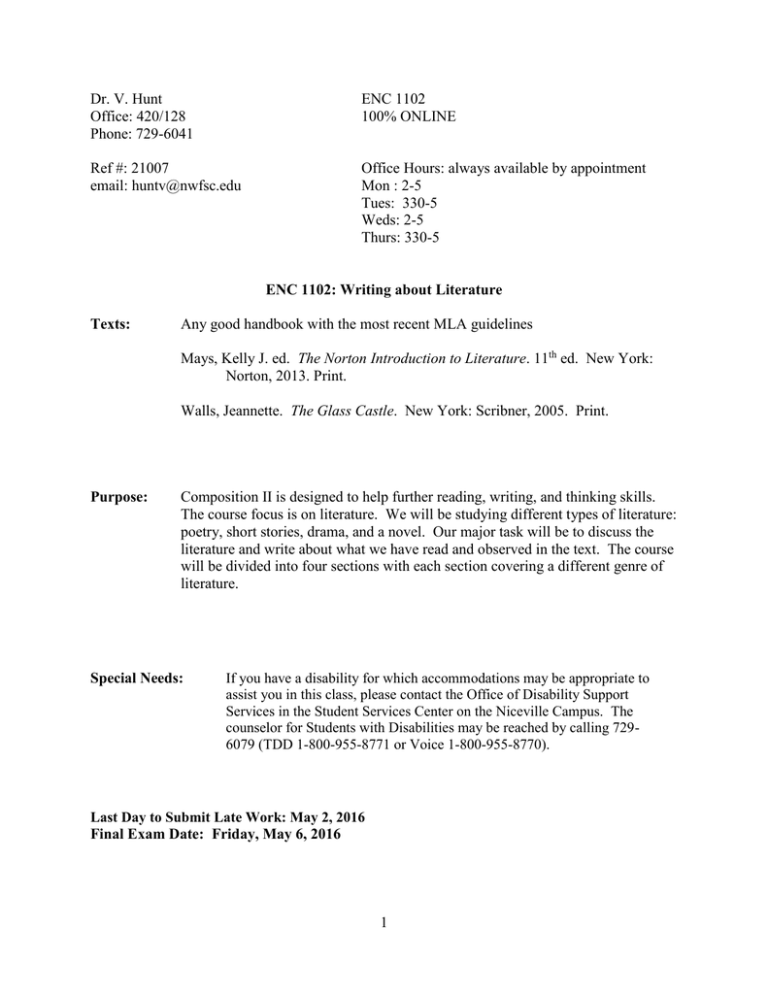
Dr. V. Hunt
Office: 420/128
Phone: 729-6041
ENC 1102
100% ONLINE
Ref #: 21007
email: huntv@nwfsc.edu
Office Hours: always available by appointment
Mon : 2-5
Tues: 330-5
Weds: 2-5
Thurs: 330-5
ENC 1102: Writing about Literature
Texts:
Any good handbook with the most recent MLA guidelines
Mays, Kelly J. ed. The Norton Introduction to Literature. 11th ed. New York:
Norton, 2013. Print.
Walls, Jeannette. The Glass Castle. New York: Scribner, 2005. Print.
Purpose:
Composition II is designed to help further reading, writing, and thinking skills.
The course focus is on literature. We will be studying different types of literature:
poetry, short stories, drama, and a novel. Our major task will be to discuss the
literature and write about what we have read and observed in the text. The course
will be divided into four sections with each section covering a different genre of
literature.
Special Needs:
If you have a disability for which accommodations may be appropriate to
assist you in this class, please contact the Office of Disability Support
Services in the Student Services Center on the Niceville Campus. The
counselor for Students with Disabilities may be reached by calling 7296079 (TDD 1-800-955-8771 or Voice 1-800-955-8770).
Last Day to Submit Late Work: May 2, 2016
Final Exam Date: Friday, May 6, 2016
1
Class Policies:
In order to pass ENC 1102:
1. You must complete every essay and the library assignment before the
last day of classes (work submitted during final exams week will not
be accepted).
2. You must earn a minimum cumulative grade of C (700 points)
Regardless of points accumulated, you will receive an F for the course unless all assigned essays
and the library assignment are submitted to Dropbox on D2L prior to the last day of classes.
I DO NOT accept late work during final exams week.
Plagiarism, intentional or unintentional, is not tolerated and may result in an F for the course.
We will discuss plagiarism at length in class. See the attached handout defining plagiarism.
When in doubt—document!
Students are responsible for adherence to all college policies and procedures including those
related to academic freedom, cheating, classroom conduct, computer/network/e-mail use and
other items included in the Northwest Florida State College Catalog and Student Handbook.
Students should be familiar with the rights and responsibilities detailed in the current Northwest
Florida State College Catalog and Student Handbook. Plagiarism, cheating or any other form of
academic dishonesty is a serious breach of student responsibilities and may trigger consequences
that range from a failing grade to formal disciplinary action.
Cell phones, pagers, and other electronic devices must be turned off during class. Don’t make
me call you out about this; doing so makes me feel like the middle-school teacher, and I don’t
like it. You can make it an hour without being on the phone.
Communication by electronic devices, including but not limited to instant messaging, text
messaging, and telephone, during class is strictly prohibited unless expressly designated as
part of the learning activities. Use of electronic communication devices during examinations
or other graded activities may constitute grounds for disciplinary action. Where emergency
or employment situations require access to electronic communication services,
arrangements may be made in advance with the instructor. In certain circumstances, (e.g.,
exams, presentations, etc.), students may be required to temporarily deposit cell phones or
other communications devices with the instructor or lab supervisor for the duration of the
specific class or activity.
Grading Scale: A = 90-100; B = 80-89; C = 70-79; D = 60-69; F = Below 60
2
Attendance:
If you fail to attend and/or participate within a 7 day period, I will submit an “excessive
absence” form to college advisors. This will not only affect your grade, it might affect
current or future funding, so be careful.
Responses (100-200 words) must be submitted by the due date and time. No make-ups
and no late responses will be accepted; however, you may miss two without penalty.
DO NOT SEND ASSIGNMENTS TO MY E-MAIL ADDRESS. I accept no responsibility
for e-mailed assignments. All assignments will be documented electronically. There is a “Late
Paper” file on Dropbox in D2L. The time-stamp from D2L serves as the time of submission.
You will have until 11:59 p.m. on the date the paper is due to post your work.
If your paper is late, it must be turned in to DROPBOX on D2L. I allow a two-hour grace
period, after which late essays begin losing points. Therefore, when late, you should post as
soon as possible; the date/time stamp will serve as the official time of submission.
YOU are responsible for ensuring the paper posts correctly, so make sure your work uploads
correctly.
Late papers will be penalized 10 points per day (capped at –30).
DO NOT SEND ASSIGNMENTS TO MY E-MAIL ADDRESS. I accept no responsibility
for e-mailed assignments.
I do not accept hard copies of late papers.
Unless otherwise stated, all papers should be in MLA style with a font no smaller than 12-point.
Last Day to Submit Late Work: May 2, 2016
3
Requirements:
Assignment
Length
Points
Drama Essay
750-1200 wds
100
12 short responses
(2 may be excused)
10 X 10 = 100
Participation Grade
5 x 10 = 50
2 Quizzes
50 x 2 = 100
Midterm Exam
100
Library & Bibliography
100
Research Analysis
150
Research Essay on the Novel 1200-1500 wds
100
Poetry Paper
w/ 3-source min.
100
750-1200 wds
4-item bibliography
& multimedia presentation
on short-story from list
50
Final Exam
50
1000
Points you can put in “the bank” to be added to final total in case you come up short of desired
final grade:
Attend poetry slam, jam, open-mic (one-time only) at any of the following venues:
Say the Word: 1st Wednesday of every month @ French Quarter Grill, Niceville
Stone Soup Poetry Third Thursday Poetry Jam @LJ Schooners, Bluewater Bay
Poetry Jam, every second Tuesday @ Crestview Public Library
Present original work or write 200-word review (due within 7 days of attendance)
Up to 20 pts
*Bonus Assignment must be posted on or before due date for credit
4
RESOURCES
The Academic Success Center (ASC) is located in the Activities Center on the
Niceville Campus. The ASC provides free learning support services such as tutoring,
ESOL, and writing assistance for all NWFSC students. Individual and group tutoring is
available in a wide range of subjects on a walk-in-basis and by appointment. For more
information, call the Academic Success Center at (850) 729-5389 or visit our website at
Free Tutoring.
Reading to Learn (R2L) is a project of Northwest Florida State College designed to
support students’ learning through direct instruction of reading strategies. Students may
access R2L at our website: Reading to Learn.
Math Labs are located in the Math Building L, Room L-131, on the Niceville Campus
and in Building 7, Room 702 on the Fort Walton Beach Campus and Room 131 at the
Crestview Center. The math labs are open to all students and provide free walk-in
tutoring for all mathematics courses. For lab hours, students may call the Math
Department at (850) 729-5377 or visit our website at Math Lab.
Smarthinking is an online, real-time tutoring offered free to students, who may
access this service via RaiderNet.
Open Computer Labs
There are numerous open computer labs throughout the Northwest Florida State
College campuses. Students may access our website for lab locations and hours:
Computer lab location and hours
Testing Center
Testing Centers administer college admissions tests, placement tests, proctored exams,
ACT/SAT, GED. CLEP, and DSST (formerly known as DANTES). General information
concerning tests, hours
Testing Center hours may be accessed on the Testing Center website at Testing
Center. Makeup exams may be taken in the Testing Center, depending upon instructor
policies on late work.
Library, Online Reference Materials, and Resources
The library is a comprehensive, learning resource center providing information in print,
digital, and multimedia formats to support the educational objectives of the College. In
addition to in-house materials, online services and resources can be accessed through
the LRC website. Library hours are posted each semester at the building entrance and
on the LRC website at Learning Resource Center
5
Assistance for Military and Veterans
Northwest Florida State College supports our military and veterans students. You may
contact NWFSC Eglin AFB Education Services Building at 850-200-4180 or NWFSC
Hurlburt Center Educational Services Building at 850-200-4190 or visit our website:
Support Our Military
Students with Disabilities
Northwest Florida State College supports an inclusive learning environment for all
students. If you have disabilities for which accommodations may be appropriate to
assist you in this class, please contact the Office of Disability Support Services on the
Niceville Campus, or call 850-729-6079 (TDD 1-800-955-8771 or Voice 1-800-9558770.
6
PLAGIARISM: Academic Dishonesty in Writing
What is plagiarism?
“Derived from the Latin word plagiarius (‘kidnapper’), plagiarism refers to a form of cheating that
has been defined as ‘the false assumption of authorship: the wrongful act of taking the product
of another person’s mind, and presenting it as one’s own’” (Lindey, Plagiarism and Originality 2).
--Modern Language Association (2003)
Is it plagiarism if I put another’s thoughts into my own words?
Yes. Paraphrasing can be plagiarism if an author doesn’t cite the source. The MLA Handbook
states that “[p]lagiarism involves two kinds of wrongs. Using another person’s ideas,
information, or expressions without acknowledging that person’s work constitutes intellectual
theft” (66).
What counts as “another’s thoughts”?
Quoted words from outside sources
Paraphrased ideas from outside sources
Borrowed information from outside sources, such as diagrams and statistics
Materials from the Internet
How do I cite my source?
Students must cite sources in two places: in parenthetical documentation in the paper itself and
on a works cited page. The parenthetical documentation immediately acknowledges the
quotation or paraphrase as an outside source, and the works cited provides further information
about where readers can access the source.
How do I use parenthetical documentation?
One should use parenthetical documentation at the end of a sentence using quoted or
paraphrased material; when in doubt, always provide parenthetical documentation.
Sample Documentation
In Everyday Theory, Bob Coleman and Becky McLaughlin define theory as “a position or
stance” (2).
Everyday Theory includes the definition of theory as “a position or stance” (Coleman and
McLaughlin 2).
Documentation Guidelines
When the author’s name appears in the sentence, write only the page number in the
parentheses.
When the author’s name doesn’t appear in the sentence, it—along with the page
number—must be included in the parenthetical documentation.
Internet sources do not require a page number in the documentation.
How do I create a works cited page?
A works cited is the final page of an essay using outside sources.
Sample Works Cited Entries
7
McLaughlin, Becky, and Bob Coleman. Everyday Theory: A Contemporary Reader. New York:
Pearson Longman, 2005. Print.
Whitmer, T. Carl. “A Post-Impressionistic View of Beethoven.” The Musical Quarterly 2 (1916):
13-31. JSTOR. Web. 11 Jan. 2009.
Works Cited Guidelines
For more information about works cited pages, see your handbook.
For more documentation samples, see “MLA and APA Documentation” on the drop
down menu at http://lrc.nwfsc.edu. Click on “How to Write MLA Documentation of
Electronic Sources.” See the Adobe files halfway down the screen for examples of
various online databases.
The Online Writing Lab at Purdue University also has additional help at http://owl.
english.purdue.edu/owl/resource
How do I avoid plagiarism?
“To guard against the possibility of unintentional plagiarism during research and writing, keep
careful notes that always distinguish among three types of material: your ideas, your summaries
and paraphrases of others’ ideas and facts, and exact wording you copy from sources.”
--Modern Language Association (2003)
How can plagiarism be prevented and detected?
Many professors use Turnitin.com, a plagiarism detection site which allows submitted essays to
be compared to archived material in Turnitin’s database. The site contains essays from cheat
sites, sites appearing on the Internet, as well as previously submitted essays from universities
and colleges across the nation.
What are the penalties for plagiarism?
“Cheating in any form, including plagiarism . . . may result in academic penalty and/or course
failure at the discretion of the instructor, [decisions] which may be appealed by the student....”
--NWF College Catalog
Why is plagiarism awareness important?
Properly documenting outside sources protects the honest student. While part of the research
process benefits students by exposing them to others’ scholarship, students are responsible for
noting others’ material so that an individual’s own work is easily distinguished and may be
evaluated. Furthermore, plagiarism, in addition to being a legal issue, is a moral and ethical
issue in which the offense of the plagiarizing student prevents honest students from being
graded fairly in a course.
8

